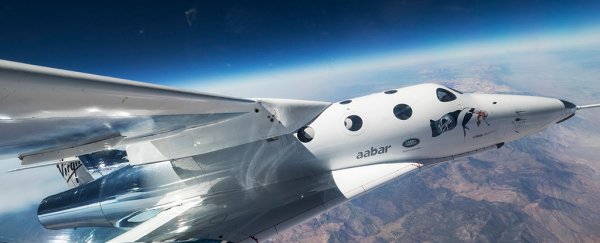When Virgin Galactic's commerical spaceplane, SpaceShipTwo, crashed to Earth back in November 2014, killing co-pilot Michael Alsbury, it was a dark day for space exploration and all those budding space tourists who'd bought a ticket to fly to the edge of Earth's atmosphere. But Virgin Galactic isn't giving up: in the company's biggest announcement since the tragedy, it's unveiled VSS Unity - a spacecraft it says will open up access to space for everyone.
The replacement for SpaceShipTwo is very similar to its predecessor, with a wingspan of 12.8 metres (42 feet) and a length of 18.3 metres (60 feet). Importantly though, there have been crucial improvements to the feather locking system that aids the descent of the aircraft, as Ars Technica reports.
"During descent, the vehicle undergoes what's called feathering, rotating the tail and wing assembly to provide more surface area and slow the craft," astronomer Phil Plait explains over at Slate. "However, one of the pilots [of SpaceShipTwo] accidentally unlocked the feathering mechanism prematurely; the mechanism deployed due to aerodynamic loads, which then broke the vehicle apart, killing one pilot and severely injuring the other."
Thanks to some serious modifcations, the accident that happened at the end of November 2014 will not be an issue for VSS Unity, say company officials.
Virgin Galactic also announced that it's moving from a 'build' phase to a 'test' phase: commercial space flight is getting closer and closer to becoming a reality, although there's no fixed date for when test flights are going to begin. The spacecraft can take two pilots and six passengers up to the edge of Earth's atmosphere.
"We seek to open space to people from all walks of life, and today's milestone is a big step toward that goal," said Virgin Galactic CEO George T. Whitesides. "Outer space is the province of all humanity, and we think it is about time that all of humanity has a chance to explore it: not just pilots but also painters, not just engineers but also everyday explorers."
VSS Unity was named by Stephen Hawking, who's planning to be one of the passengers on board the spacecraft's inaugural flight.
"I have long been an enthusiastic supporter of human spaceflight, and in particular, efforts aimed at making this enormous human achievement more accessible," Hawking said in a message broadcast at the launch event. "The first private astronauts will be pioneers. The first flights are expensive. But over time, I hope that space flight will become within the reach of far more of Earth's population."
Before SpaceShipTwo crashed, 700 customers had already signed up for a trip to space at a ticket price of US$200,000-250,000. While Virgin Galactic confirmed that some of those people had asked for a refund after the tragedy, it also said that most customers have kept the faith, and the waiting list is now longer than ever.
"Together, we can make space accessible in a way that has only been dreamt of before now, and by doing so can bring positive change to life on Earth," said Virgin Group founder Sir Richard Branson.
We don't want to jump the gun too much, but if VSS Unity works like it should, maybe one day we're actually going to need a few of these.
